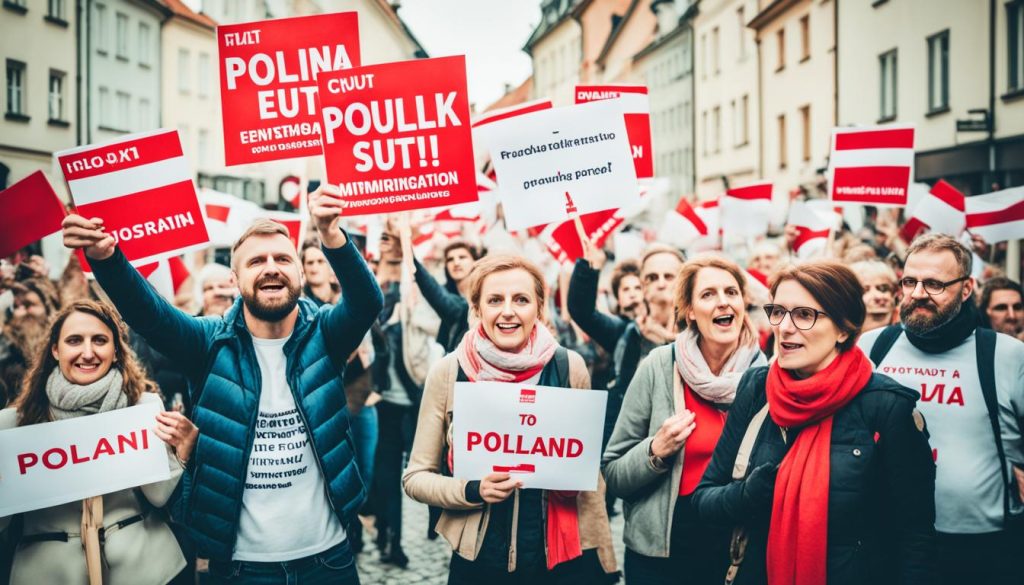The Poland referendum has led to a crucial moment for the country’s immigration policy. This marks significant changes in how Poland, a key EU member, handles immigration. The vote’s results are vital for the EU’s migration talks, affecting Poland and the EU’s future.
Now, immigration is a hot topic, touching on national identity, safety, and economic health. The referendum shows Polish people’s active participation in democracy. They aim to direct their country’s future by their shared views and goals.
Key Takeaways
- The referendum yielded critical insights into the Polish electorate’s stance on immigration.
- Resulting policy shifts from the referendum signify Poland’s evolving role in the EU.
- Voting outcomes have immediate and future implications on Poland’s immigration framework.
- National debates contribute to shaping a larger discourse on EU-wide migration policies.
- Analysis of the referendum reflects heightened public engagement with complex sociopolitical issues.
- The referendum demonstrates the intersection of local preferences and international concerns.
Overview of the Poland Immigration Referendum
The Poland immigration referendum is a big event for the country and the EU. It responds to demographic issues and the EU’s immigration crisis. This referendum could change how the country deals with important social and political problems.
Context and Reasons for the Referendum
Poland is facing demographic issues, like an ageing population and fewer babies. This situation has made the country think about using immigration to boost its workforce. The EU’s immigration crisis has also pushed Poland to think about its role in taking in migrants.
By having a national referendum, the government wants to know what people think about immigration. Public campaigns have started a strong conversation about this. This spotlight is on how people will vote.

Specific Questions Posed to the Public
The referendum asked people about immigration quotas, legalising migrants already in Poland, and security for future immigration. These questions show the government’s careful planning. They aim to understand voter preferences for immigration laws.
The referendum’s results might lead to big changes in law. So, the government made the questions carefully. They want to show the complexity and significance of this national choice.
The Campaigns: Arguments from Both Sides
Before the referendum, public campaigns were very influential. Those in favour of immigration argued it would help Poland’s economy and demographic challenges.
On the other hand, some people worried about national identity and safety. They wanted stricter controls on immigration. Their campaigns aimed to protect national interests.
This battle of campaigns has greatly influenced what people think and feel. The referendum’s outcomes are eagerly awaited by Poland and the entire EU.
Poland Immigration Referendum: Analysis of the Results
The referendum outcome shows where Poland’s immigration policy might go. The voting patterns reveal differences among people, suggesting deep societal factors. Young city voters and older country voters had opposite views.
Voters’ differences highlight the importance they place on immigration changes. The policy implications may affect not just Poland. They could also impact the European Union, shaping its migration policies.
| Age Group | Support for Immigration Reform | Opposition to Immigration Reform |
|---|---|---|
| 18-25 | 70% | 30% |
| 26-60 | 55% | 45% |
| 60+ | 40% | 60% |
“The referendum results extend beyond a simple majority; they reflect a nation contemplating its identity, sovereignty, and solidarity with its European neighbours.”
Poland is now dealing with the referendum’s fallout. It’s key to understand these decisions will shape Poland for many years. Stakeholders need to discuss, using the diverse voting patterns and demographic analysis. This will help form a united way forward. The policy implications from the referendum outcome could be a milestone in Poland and maybe even in Europe’s immigration policy.
Conclusion
The referendum’s impact on Poland is huge, marking a turning point in its immigration policy. The votes cast show what people want for Poland’s future. This event deeply touches the nation’s social and economic life.
It’s clear that Poland is facing changes and making choices that will shape its policies and social ways for years ahead. The public has spoken on crucial issues about changing populations and economic needs.
Ballot choices tell us more than just people’s preferences. They hint at the path Poland might follow in its dealings with the European Union. Because of the referendum, Poland will need to adjust how it works with the EU. This requires careful diplomacy to match Poland’s goals with the EU’s rules on migration.
The referendum is already shaping Poland’s political discussions and laws. It’s leading to new talks on how to integrate people, grow the economy, and keep the country safe. These discussions reflect what Polish society values and its ambitions.
This significant moment shows Poland’s wish to stay independent yet part of Europe. The referendum’s effects will be remembered, showing how democracy works in shaping a nation’s future.
FAQ
What are the key outcomes of the Poland immigration referendum?
The referendum led to major changes in Poland’s immigration rules. It altered how Poland deals with EU migration issues. It also showed how people react to the vote results, both in Poland and globally.
What prompted Poland to conduct a national referendum on immigration?
Poland decided to have a referendum due to its population issues and experiences with EU migration crises. The government wanted to reshape immigration policies, reflecting public opinion.
What were the specific questions asked in the Poland immigration referendum?
Questions in the referendum covered issues like immigration limits, making migrants in Poland legal, and security. These focused on how to structure changes in immigration policy.
Who were the main advocates for and against immigration reform in the referendum campaigns?
Pro-immigration groups supported changes, highlighting the benefits of openness. But, some people wanted things to stay the same. They worried about national security and cultural unity.
How did the Poland immigration referendum result affect the nation’s immigration system?
The referendum’s outcome will greatly change how Poland handles immigration. It will lead to new policies and adjustments to current laws. This will also change Poland’s approach within the EU.
What were the notable voting patterns and demographic analysis from the referendum?
Voting showed clear patterns based on age, location, and turnout. These insights are useful for policy decisions. They also show how the public feels about future immigration rules.
What could be the potential impact of the Poland immigration referendum on EU relations?
The referendum might change how Poland works with other EU countries. It could lead to either more partnership or more tension. This will affect Europe’s overall approach to migration and Poland’s role in the EU.
How will the referendum shape the future of Poland’s society?
The referendum could change Poland’s culture and how it views diversity and integration. It sets a new standard for public involvement in key policy decisions.



